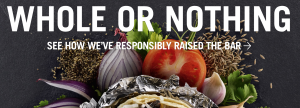As the E. coli O26 cases associated with Chipotle restaurants grows to 45 (with six additional cases linked to restaurants outside the Pacific North West) shares fall and according to Reuters, folks start talking about trust. Blue Bell is dealing with this too, but the cult of Texas ice cream eaters might be stronger than burrito lovers in college towns and the burbs. Or not.
Diners at Chipotle Mexican Grill locations on Saturday said freshness and convenience outweighed concerns about contamination following the news that food poisoning cases had erupted at the chain’s locations in six U.S. states.
“I’m not going to get flipped out by all the horrible things that could happen. I think Chipotle is cutting-edge,” said Marguerite Regan, 50, in Wichita, Kansas.
Brandon Doby, a 19-year-old Colgate University student who picked up food at a Chipotle in Syracuse, New York, said: “I’m aware of the E. coli breakout, but I’ve got bigger things to worry about than E. coli.”
Alex Boucounis, 17, who also ate at the Syracuse restaurant on Saturday, said he was concerned and planned to research exactly which stores had been hit. He said he had not realized that New York was affected.
“It tastes good. It goes down good, and it’s a lot cheaper than bar food, and it’s a lot better for you too,” he said.
“I can’t live my life worried about some minute possibility something might kill me,” said Stan Yao, 29, a Harvard Law School student.
In a statement on Friday, Chipotle said it had expanded testing of key ingredients and examined food-safety procedures in its restaurants in the wake of the outbreak.
“In practice, as someone in food safety and someone who focuses on that and as a concerned customer, I’d want to know what the specifics of that are,” said Ben Chapman, an assistant professor at North Carolina State University who studies food safety.
I was talking about the plans Chipotle lists on their website:
Chipotle is also taking significant steps to be sure all of its food is as safe as possible. Specifically, we are expanding testing of key ingredients, examining all of our food-safety procedures to find any opportunity for improvement, and are working with two renowned food safety scientists to assess all of its food safety programs, from the farms that provide our food to our restaurants.
It’s easy to talk food safety, but what does this all actually mean? Testing of what, for what? What specific food safety procedures. Some details would be nice.
